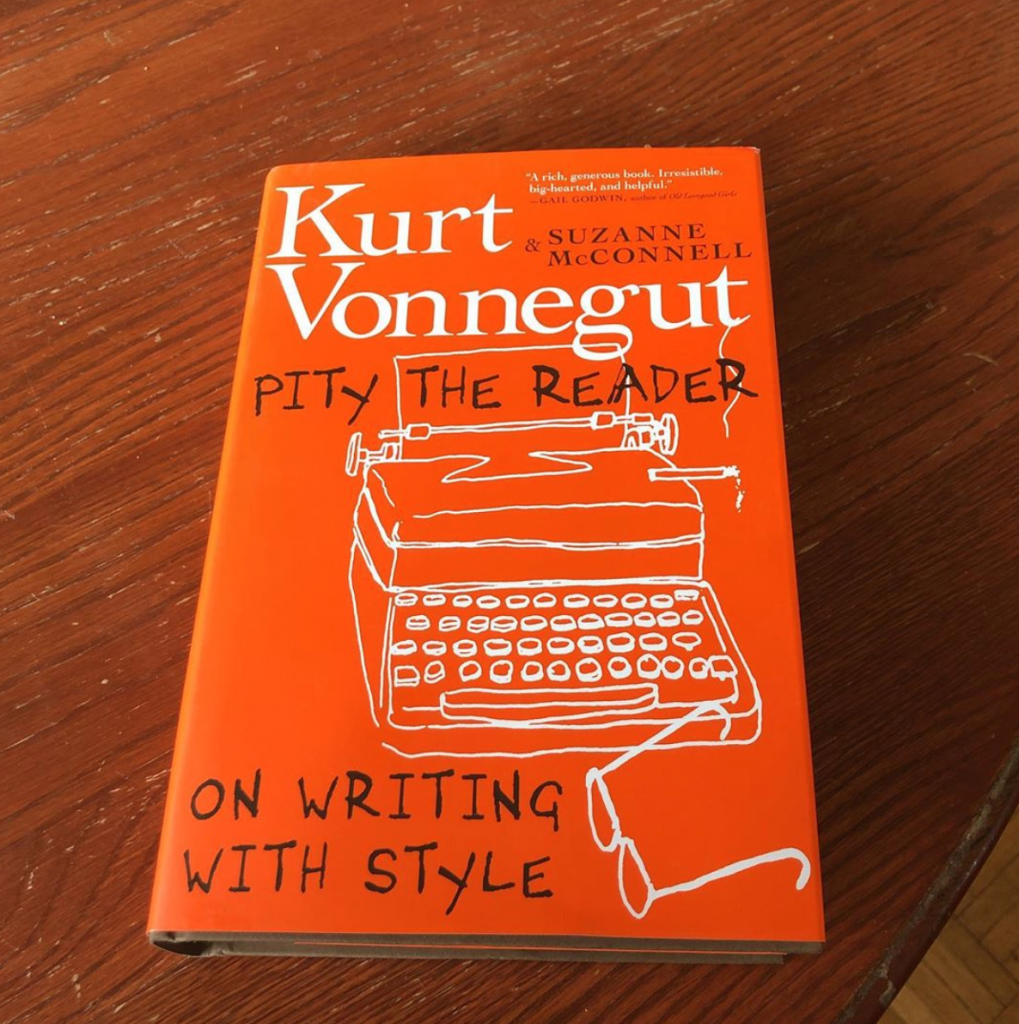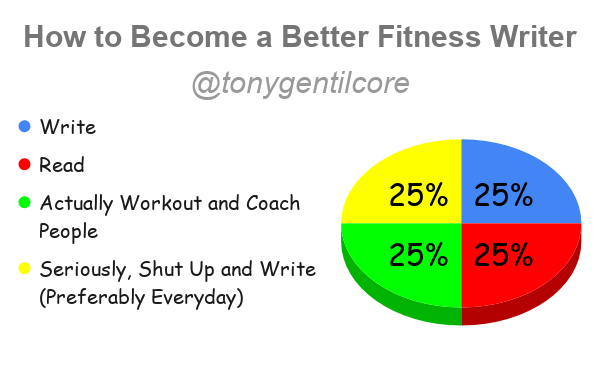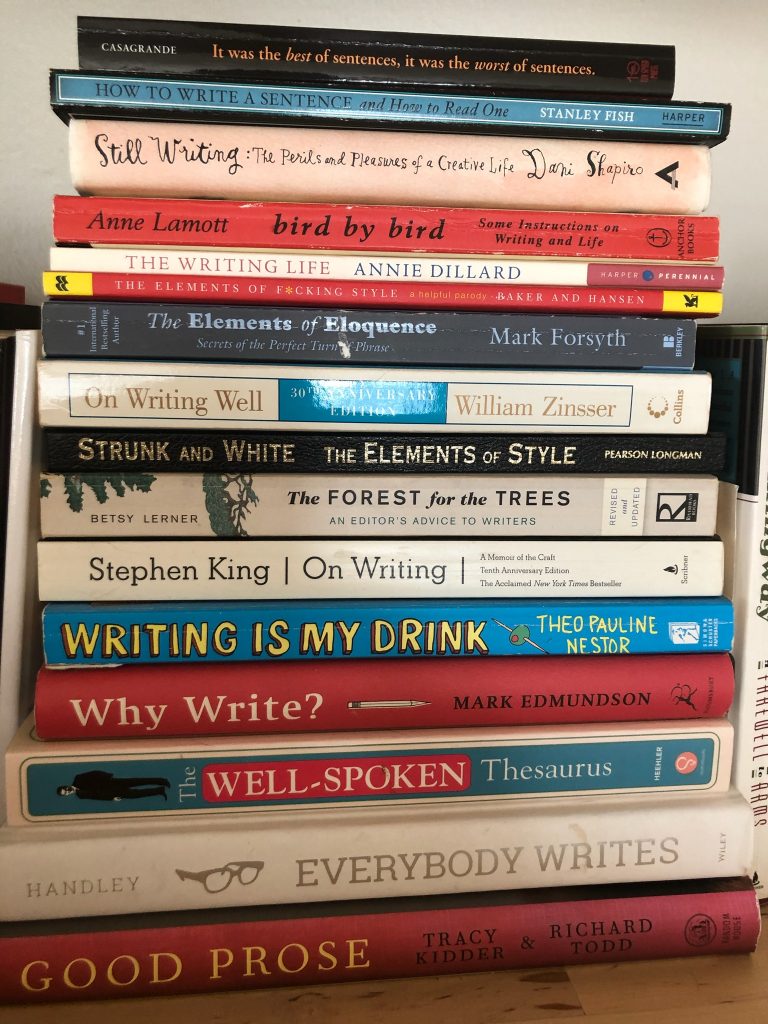4 Ways to Become a Better Fitness Writer
I recognize this post won’t resonate with some of you reading. For many a post about fitness writing is about as exciting as watching NASCAR or, I don’t know, a documentary about tree bark.
That said, I have long championed the idea that the ability to write – and write well – is an undervalued skill that would behoove many fitness professionals to indulge in.
Why does it matter?
- It’s a great way to separate yourself from the masses and to leverage your ability to create additional revenue streams.
- Also, everybody knows basic human decency and decorum revolves around the appropriate and valid use of the Oxford comma.
Fear not!
This post will not deteriorate into a diatribe on grammar or any “rules” centered on writing. Instead, the purpose of today’s post is to provide some palatable, bite-sized insights – based mostly off my own experience – on how you can become a better (fitness) writer if that’s something you’re interested in.

Copyright: rangizzz / 123RF Stock Photo
I Write Stuff
Growing up I never thought those words would define me in any significant way. To be fair, when I was growing up in the 80’s and 90’s my goal(s) in life were to beat Mike Tyson in Mike Tyson’s Punch Out, have the ability to talk to animals, and becoming an honorary member of the “Bash Brothers.”
I wasn’t much of a reader, nor writer as a kid.
Sure, I read Encyclopedia Brown and Choose Your Own Adventure books, but the bulk of my reading as a kid growing up in middle-of-no-where central New York consisted of Sports Illustrated and The Source magazine.
“Writing,” for the most part, consisted of nothing more than me curating varying iterations of that year’s MLB All-Star team; going so far as to drum up my own 1st, 2nd, and 3rd Divisional All-Star teams.
Yeah, you’re welcome Tim Teufel.1
I never thought in a million years I’d be a writer, much less get paid to do it. I often joke that if my high-school English teacher, Ms. Davie, ever found out I was a published author she’d likely die of elevated levels of flabbergastedness.
Nevertheless, here we are.
The other day on Instagram I made mention of a recent book purchase: Kurt Vonnegut & Suzanne McConnell’s “Pity the Reader: On Writing With Style.”

I noted in the caption that I place a lot of value in my growth and maturation as a writer – an adequate one at best – on my proclivity to READ books written by authors on their writing process.
Their thought process, how they structure a sentence (a paragraph, a story), how to better engage the reader, them pontificating on their struggles and subsequent caffeine consumption, and, sure, whether or not they use a semicolon (;)…is fascinating to me.
SIDE NOTE: Kurt Vonnegut didn’t care for the semicolon, noting:
“Do not use semicolons. They represent nothing. All they do is show you’ve been to college.”
Sheepishly, I use the semicolon; I assume correctly.
Anyway, not to bore you with a detour, but my first introduction to Vonnegut was in my mid-to-late 20’s. I went through a hefty “Vonnegut phase” after a break-up.
Long story short: My girlfriend broke up with me, I was heartbroken, and I needed something to take my mind off her. One day I randomly came across a list online titled “Top 100 Ways to Spy On Your Ex and Not Get Arrested” “The Modern Library’s Top 100 Novels of the 20th Century.” I noticed some guy with the last name Vonnegut was on there numerous times – Cat’s Cradle & Slaughterhouse-Five – and that both novels were relatively short (a key factor, at that time, on whether or not I’d even attempt to read it).
I started with Cat’s Cradle.
BOOM.
I was hooked.
That summer I read in the ballpark of 15-20 novels from that same list (including the likes of Hemingway, Steinbeck, Lee, Salinger, and Nabokov).
But Vonnegut’s work was the one that resonated with me most.
I awed in its simplicity and beauty. Too, I was inspired by his uncanny ability to use humor in his writing. It’s not at all a stretch for me to say Kurt Vonnegut’s style of writing helped to shape mine.
To that end, and to get to the point already, I came up with a nifty (yeah, that’s right…nifty) graphic which displays my “formula” to becoming a better (fitness) writer.

1. Write
It’s that simple.
Just like you wouldn’t expect to get better at cooking, making your foul shots, or speaking Klingon without partaking in those activities ad nauseam…
…the same goes for writing.
You have to, you know, do it.
It’s a skill, like everything else, which requires repetition in order to master.
Moreover, and this is a point that’s lost on many people, writing doesn’t mean writing a novel. A Tweet counts as writing. An email counts as writing. Hell, a thank you letter counts as writing.
Take every opportunity, even the seemingly inconsequential ones, to hone the craft.
2. Read
Fiction, non-fiction, autobiographies, graphic novels, comic books, the Kama Sutra.
…read them all.
Immerse yourself in a diverse pool of prose.
Good writing is good writing.
I firmly believe those who are m0re avid (and diverse) readers tend to be better writers because, well, it just makes sense. Reading good writing is a splendid way to inspire your writing.
And speaking about books focused on writing, for those interested, here’s a picture I took from my own bookshelf:

3. Actually Workout and Coach People
One of the most common questions I’m asked from other fitness professionals is:
“Where do you come up with so many ideas to write about?”
See #2.
More to the point, however, there’s a reason why I don’t write about fixing cars, Rococo art, or how to train bomb sniffing dolphins.
None are my area of expertise.
I do, however, like to lift heavy things and actually coach people.
Both provide more than enough “meat” for me to write about.
Plus, and it saddens me I have to say this: I think if you’re going to write about fitness you should actually, you know, practice fitness.
It’s not hard to tell the difference between those articles written by people who actually workout and have experience coaching real people compared to those who do neither.
4. Seriously, Shut Up and Write
No, seriously…shut up.2
Writing is hard. What you write will be awful, likely for a long time. You will feel like an abject failure.
Welcome to the club!
Embrace the suck.
Write.



Comments for This Entry
Dan John
This is excellent. Thank you for sharing this with us.December 4, 2019 at 5:48 pm |
Tony Author
Means a lot to get affirmation from you Dan. Thank you.December 5, 2019 at 1:48 pm |
Rick Howard
Excellent read! Great use of the 25% needed to be a better fitness writer!December 4, 2019 at 8:56 pm |
Shane McLean
Wow, Dan John left a message. Awesome. Great post coach. My wife, mother who are both English teachers are amazed l get paid to write. You have been a huge influence on the way l coach and the way l write. And you've been a huge supporter of my work. And yes. I used the word huge 3 times now. Thanks coach.December 5, 2019 at 8:12 am |
Joan
Tony, you have walked the walk and your writing has grown so much since the early days!! So proud to know you and thrilled for your success. You deserve it all and more! xoDecember 5, 2019 at 7:47 pm |
Tony Author
Thank you Joan. Complete aside: I now have six (yes, SIX) couples that I work with. I still refer to you and Mick as the most competitive.....ever!December 6, 2019 at 8:13 am |
Alberto Alvarez
Loved this, Tony. Thanks for the sharing and the nudge.December 6, 2019 at 11:51 am |